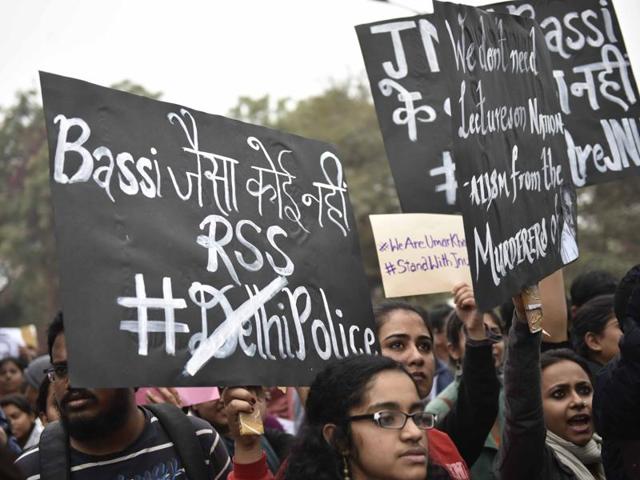Hyderabad univ to JNU: Dialogue the way to tackle ideological conflicts
Instead of pursuing the path of a dialogue, Modi’s government used police action in the JNU and bureaucratic methods in the Hyderabad Central University (HCU) to tackle ideological conflicts.
Addressing a meet on ‘Hindu-Buddhist initiative on conflict avoidance’ in Delhi in September, Prime Minister Narendra Modi had said, “It is my firm belief that the solution to all problems lies in dialogue… Ideologies which close the gates for dialogue have the propensity for violence…”

Instead of pursuing the path of a dialogue, Modi’s government used police action in the JNU and bureaucratic methods in the Hyderabad Central University (HCU) to tackle ideological conflicts. And the PM maintained silence on both the incidents – also during protests by students of the Film and Television Institute of India (FTII) against imposition of an artist as the director.
The government had directed HCU authorities to curb ‘anti-national and casteist forces’ on the campus leading to suspension of five Dalit students from the hostel and this later drove Rohit Vemula to commit suicide. In the JNU, police arrested students’ union president Kanhaiya Kumar and launched a hunt for some others over ‘anti-national’ activities.
“The BJP could have taken a moral high ground by asking for a dialogue with the Congress, Left and other parties to tackle what it called anti-national activities in JNU and HCU. It could have asked the media to come along and investigate the alleged anti-national and terror activities,” said Arun K Patnaik, a professor at the Hyderabad University.
Patnaik was among a few academics and activists who attempted at HCU to engage the ABVP and the Ambedkar Students’ Association, accused of anti-national and casteist activities, in a dialogue. “Neither the new vice chancellor (of HCU) nor NDA ministers believe in dialogue for they have gone for an easy method of legal solutions to an ideological dispute,” said Patnaik, emphasising that legal measures or use of force to settle ideological and political disputes would not work in India which had fought against the draconian Emergency rule.
From FTII to HCU to JNU, the ruling party’s response shows a pattern: It is rash and provocative to democratic-minded individuals and organisations. The sangh parivar’s combative approach to opponents exposes its culture of intolerance.
“The attack on JNU is aimed at striking terror at anyone who does not accept a particular set of ideas acceptable to the party in power,” said Biswamoy Pati, a professor of history at Delhi University.
“The happenings at Patiala House demonstrate storm-trooping action where a student leader is beaten up inside a temple of justice. The double standards of the party in power and the police are responsible for this. It appears that you can get away with whatever you want with the national flag and slogans of Bharat Mata ki Jai,” Pati said.
The action of alarmist NDA managers in HCU and JNU helped non-ABVP students’ organisations and non-BJP parties come together. A united opposition demanded justice to a Dalit student who ended life and it is now raising pitch in the JNU battlefield for the right to dissent and against a monolithic Hindutva nationalism.





